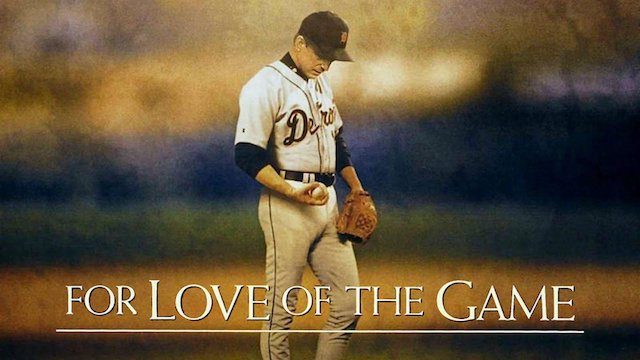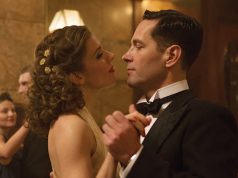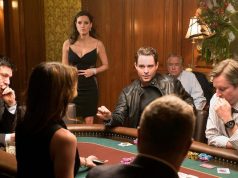
My relationship with baseball is complicated. I grew up with brothers and a dad who were enthusiastic players and fans, and so my childhood memories of summertime are filled with Dodger games on TV and many warm nights at the Little League field, where it seems like my brothers were always playing, or my dad was always umpiring, or my mom was acting as official scorekeeper.
The complicated part is that I never had any interest in playing baseball, and only passing interest in watching it. I’ve never made the choice to watch a game on TV — but if I’m with people who are watching one, I will gladly follow along. It feels like an essential part of America, and I’m a fan of America. Baseball is also part of my family, and since I love my family I guess I also love baseball. The sport has personal meaning for me.
I suspect that’s why “For Love of the Game,” Kevin Costner’s love letter to baseball, worked so well on me when I saw it in 1999. Not only is it about the pure joy of the sport, it has Vin Scully as the play-by-play announcer — Vin Scully, who’s been calling Dodger games for like 80 years and who is basically the voice of my childhood. Even if I wasn’t paying attention to the game on TV, I could hear good ol’ Vin describing it. I probably have a Pavlovian response to that man’s warm, friendly voice.
What I said then:
“After a string of disappointing (and even downright bad) films, Costner reminds us in this one why we ever liked him in the first place. He IS capable of acting, even emoting at times. When he wants to be, he’s an effective Everyman, a guy that both men and women find appealing and enjoyable to watch…. It’s a genuinely compelling storytelling format, and the leisurely sport of baseball lends itself nicely to such reflection…. If any movie can restore America’s love for this game, it’s this one. The outcome of the game is fairly predictable, but still quite thrilling, as all good sports movies are, and the casting of real-life announcer Vin Scully as the play-by-play man was pure genius…. If Vin Scully tells me that baseball is a fantastic game, and a metaphor for life, and all the other things this movie tells me it is, I believe him. You’ll believe, too.” Grade: A- [complete review]
A majority of critics gave it favorable reviews, but just barely: Rotten Tomatoes has it at 54%. Very few of them, other than mine, were all-out raves, instead falling into the three-stars-out-of-four range. Some of the negative reviews explicitly said that the movie doesn’t work at all if you’re not already a baseball lover (and I agree). Others found the whole thing just plain boring. Would a second viewing, 12 years later, have the same effect on me?
The re-viewing:
Remembering very few details and not having read my review before I watched it, I was surprised by the opening credits — Sam Raimi directed this? I’d have sworn it was Costner himself. I’d also forgotten that it has three guys in the cast who have since turned out to be among my favorite actors: John C. Reilly, Brian Cox, and JK Simmons. This was shaping up to be a fine film, and for reasons I wouldn’t have even appreciated in 1999!
Ugh, then there’s Kelly Preston. She performs without distinction a role that is the film’s weakest attribute anyway, that of Costner’s love interest. The film’s structure has Costner’s Billy Chapel pitching what may well be the last game of his major-league career, and reflecting on his past as he does so. Some of those flashbacks relate directly to baseball — old teammates being traded away, new guys looking to him as a mentor — but most of them concern Billy’s relationship with Preston’s character, Jane. He’s a celebrity athlete who lives for baseball; she’s of secondary importance; yada yada. My notes contain this rather diplomatic observation: “non-baseball scenes are a little flat.”
Sometimes the movie is too on-the-nose, as when Billy injures his hand during the off-season and must be rushed to the hospital. He tells Jane to call his trainer: “He’s the most important person for me right now!” Jane is devastated to have it spelled out in no uncertain terms that the man responsible for saving her boyfriend’s career is more important to him than she is. (Being married to John Travolta in real life, she is probably used to bitter disappointment.)
On the other hand, some of the movie’s hokeyness is charming, in that old-fashioned, take-me-out-to-the-ball-game kind of way. The first few scenes lay it on thick: it’s the last game of the season; Billy’s beloved team owner has sold the team; Billy will probably be traded; Jane is about to move to London. This is truly the Big Game. It ALL COMES DOWN TO THIS!! I roll my eyes at that, but I have to admire the earnestness. And the fact is, baseball often does come down to do-or-die situations. “Bottom of the ninth, two outs, three runs behind, bases loaded” is a cliche — but it happens! Those off-the-field circumstances that can fill a game with added meaning are part of the reason sports fans love their sports.
Raimi does a terrific job switching back and forth between putting us on the field with Costner and putting us in the TV viewing audience, with Vin Scully guiding us. Scully’s lines must have been scripted, but he delivers them naturally, and they all sound like things he would really say. Look at how he sums things up:
“You get the feeling that Billy Chapel isn’t pitching against left handers, he isn’t pitching against pinch hitters, he isn’t pitching against the Yankees. He’s pitching against time. He’s pitching against the future, against age, and even, when you think about his career, against ending. And tonight I think he might be able to use that aching old arm one more time to push the sun back up in the sky and give us one more day of summer.”
Reading that, I think it’s corny. Hearing it delivered by Vin Scully, I think it’s beautiful. The game’s final stirring moments build suspense the way most sports movies do, before delivering a cathartic and satisfying finish. Scully says: “The cathedral that is Yankee Stadium belongs to a Chapel.” Yeah, it’s hokey. But tell that to the lump in my throat!
Do I still love this movie?
No, but I honestly do like it. Costner’s running monologue as he pitches, his interaction with his catcher/friend John C. Reilly, all the commentary that encapsulates the simple pleasures of the sport, Basil Poledouris’ rousing musical score — that stuff works, and it works well. If it weren’t for the just-average relationship story on the side, this would be a classic of the Baseball Movie genre. Grade: B
— Film.com




